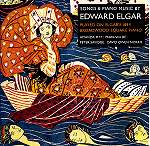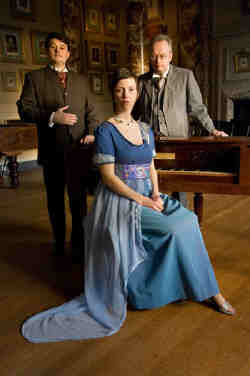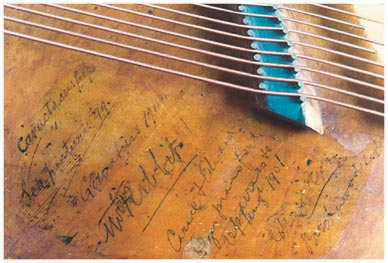
CD 1
Seven Lieder
1. Like to the damask rose (Simon Wastell) [1892]
2. Queen Mary’s Song (Tennyson) [1887]
3. A Song of Autumn (A. Lindsay Gordon) [1887]
4. The Poet’s Life (Ellen Burroughs) [1892]
5. Through the long days (Col. John Hay) Op.16 no.2 [1885]
6. Rondel (Longfellow, after Froissart) Op.16 no.3 [1894]
7. The Shepherd’s Song (Barry Pain) Op.16 no.1 [1892]
8. A War Song (Hayward) [1884/1903]
9. Is she not passing fair? (Duc d’Orleans, trans. Costello) [1886]
10. *As I laye a-thynkynge (Ingoldsby) [1887]
11. Salut d’amour Op. 12 [1888] Piano
12. The Wind at Dawn (C.A.Roberts) [1888]
13. After (P.B.Marston) Op.31 no.1 [1895]
14. Woodland Interlude from Caractacus Piano
15. Dry those fair, those crystal eyes (H.King) [1899]
16. The Pipes of Pan (Adrian Ross) [1900]
Sea Pictures Op.37 [1899]
(Elgar’s own piano version)
17. Sea Slumber Song (R.Noel)
18. In Haven (Capri) (C.A.Elgar)
19. Sabbath Morning at Sea (E.B.Browning)
20. Where Corals Lie (R.Garnett)
21. The Swimmer (A. Lindsay Gordon)
CD2
1. *Prelude and Angel’s Farewell [1900] Piano (Elgar’s own piano version)
2. Come, Gentle Night (C.Bingham) [1901]
3. In the dawn (Benson) Op.41 no.1 [1902]
4. Speak, Music (Benson) Op.41 no.2 [1902]
5. Dream Children Op.43 - I [1902] Piano
6. Dream Children Op.43 - II [1902] Piano
7. Arabian Serenade (Lawrence) [1914]
8. In Moonlight (Shelley) [1904] S
9. Pleading (Salmon) Op.48 [1908]
10. O soft was the song (Parker) Op.59 no.1 [1909]
The Fringes of the Fleet (Kipling) [1917] B & Chorus
11. The Lowestoft Boat
12. Fate’s Discourtesy
13. Submarines
14. The Sweepers
15. * “?” [March 1918] Piano
16. It isnae me (S.Holmes) [1930]
17. *XTC (unpublished, to Elgar’s own words) [November 11th 1930]
|
|

The Works
David Owen Norris, piano
Amanda Pitt, soprano
Mark Wilde, tenor
Peter Savidge, baritone
Avie AV 2129 [2-cd set]
I was really excited to receive these discs for review; excited by the concept - songs and piano music centred around Elgar's own 1844 Broadwood Square Piano which lives at Hatchlands, Surrey, on permanent loan from the Royal Academy of Music.
I am also an admirer of David Owen Norris' approach to music and his wonderful sensitivity to historic keyboards (for evidence of this listen to The World's First Piano Concertos with Sonnerie). Three fine singers, a beautifully produced booklet (Owen Norris' notes are well written and fascinating) complete what should be a good package.
Yet it doesn't quite “do it” for me. The problems start from the very first note: the piano is simply not a good sounding instrument. The strings are presumably the original old ones and create a very false sound, especially in the treble registers, other times the instrument is simply out of tune.
Is it possible that the instrument was once a fine-sounding musical tool that Elgar enjoyed composing on  (some of his compositions are titled by him on the soundboard!) but is now simply played out? (some of his compositions are titled by him on the soundboard!) but is now simply played out?
Whatever, this is an uncomfortable listening experience, despite the best efforts of all concerned. Owen Norris creates a rich and varied palette of tone-colours – a much wider range of effects than is possible on a modern grand – but the earlier mentioned problems make it a difficult performance to relax into.
The singers likewise do not sound comfortable singing with this instrument. Amanda Pitt and Mark Wilde seem to be searching for an accompanying sound to sing into, with the result that these are unsettled performances with occasional lapses of tuning particularly in slower, quieter moments. Only in Peter Savidge's performances did I feel a good balance between piano and voice.
There is no question this is an important instrument and David Owen Norris has created an interesting and fascinating study. There are three premiere recordings, the composer's own piano version of Sea Pictures and a couple of items from Gerontius - and some wonderful songs. I am just not sure what insight this recording offers us: the piano (a composing instrument to Elgar, presumably not his choice of concert piano) would need a lot of work to sound anything like it did when Elgar had it (already 50 years old!) and ultimately the question of whether the music is served by such a venture is not answered affirmatively for me.
Steven Devine
Steven Devine is Director of Education at the Finchcocks Collection of Early Keyboard Instruments
See Musical Pointers' review of his most recent CD, "Portrait of an English Harpsichord".
|



